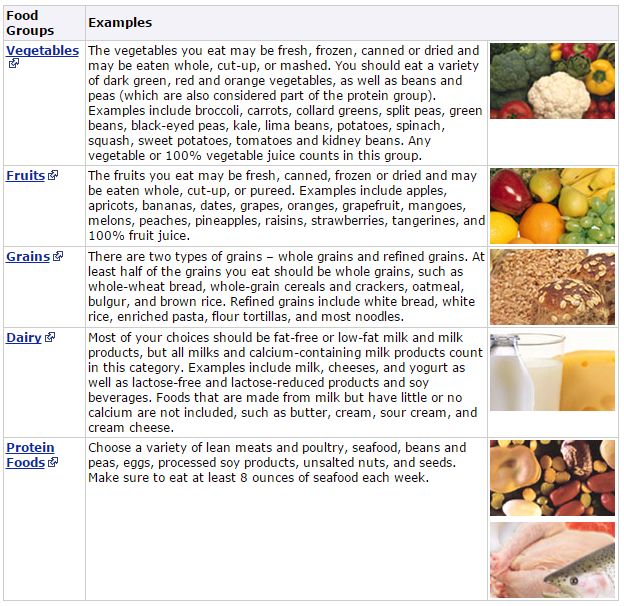Do you ever feel like you can't keep up with the changes in technology? Sometimes it seems that way with dietary advice, as if things are always changing. While it's true that the fields of diet and nutrition are areas of evolving research, there are some basic concepts you can keep in mind. By knowing these basics, you will be better equipped to sort through nutrition research and dietary advice.
Food Groups
What are the basic food groups? Foods are grouped together when they share similar nutritional properties, by understanding the basic food groups, you'll be able to plan a healthy daily diet.
Are you interested in healthy eating and having a balanced diet? If so, you'll want to learn more about food groups.
This section helps explain the food groups based on the Dietary Guidelines for Americans, 2010 and provides information about food plans. There are five groups consisting of vegetables, fruits, grains, dairy and a protein group which includes meat, poultry, fish and nuts. MyPlate illustrates the five food groups that are the building blocks for a healthy diet using a familiar image—a place setting for a meal —and display how much of each food group you need to eat for a healthy diet
What are the basic food groups?

Oils are NOT a food group, but they provide essential nutrients such as vitamin E.
How much of each food group should I eat?
The amount of food you need to eat from each group depends on your age, sex, and level of physical activity.
Food Plans
A healthy eating plan will show you how much you need from each food group to stay within your calorie needs and promote good health. A healthy eating plan can also help you learn—
How many calories you need each day and how to balance your calorie needs.
How much of each food group you should consume.
How to make healthy choices in each food group.
Water
Water is involved in every function of the body. It's in every cell, tissue and organ of the body. In this section you'll learn why getting enough water every day is important for your health.
Ever notice how lifeless a house plant looks when you forget to water it? Just a little water and it seems to perk back up. Water is just as essential for our bodies because it is in every cell, tissue, and organ in your body. That's why getting enough water every day is important for your health.
Healthy people meet their fluid needs by drinking when thirsty and drinking fluids with meals. But, if you're outside in hot weather for most of the day or doing vigorous physical activity, you'll need to make an effort to drink more fluids.
Where do I get the water I need?
Most of your water needs are met through the water and beverages you drink.You can get some fluid through the foods you eat. For example, broth soups and other foods that are 85% to 95% water such as celery, tomatoes, oranges, and melons.
What does water do in my body?
Water helps your body with the following:
Keeps its temperature normal.
Lubricates and cushions your joints.
Protects your spinal cord and other sensitive tissues.
Gets rid of wastes through urination, perspiration, and bowel movements.
Why do I need to drink enough water each day?
You need water to replace what your body loses through normal everyday functions. Of course, you lose water when you go to the bathroom or sweat, but you even lose small amounts of water when you exhale. You need to replace this lost water to prevent dehydration.
Your body also needs more water when you are—
In hot climates.
More physically active.
Running a fever.
Having diarrhea or vomiting.
To help you stay hydrated during prolonged physical activity or when it is hot outside:
1-Drink fluid while doing the activity.
2-Drink several glasses of water or other fluid after the physical activity is completed.
Also, when you are participating in vigorous physical activity, it's important to drink before you even feel thirsty. Thirst is a signal that your body is on the way to dehydration.
Some people may have fluid restrictions because of a health problem, such as kidney disease. If your healthcare provider has told you to restrict your fluid intake, be sure to follow that advice.
Tips for Increasing Your Fluid Intake by Drinking More Water
Under normal conditions, most people can drink enough fluids to meet their water needs. If you are outside in hot weather for most of the day or doing vigorous activity, you may need to increase your fluid intake.
If you think you're not getting enough water each day, the following tips may help:
Carry a water bottle for easy access when you are at work or running errands.
Freeze some freezer-safe water bottles. Take one with you for ice-cold water all day long.
Choose water instead of sugar-sweetened beverages. This tip can also help with weight management. Substituting water for one 20-ounce sugar-sweetened soda will save you about 240 calories.
Choose water instead of other beverages when eating out. Generally, you will save money and reduce calories.
Give your water a little pizzazz by adding a wedge of lime or lemon. This may improve the taste, and you just might drink more water than you usually do.
Do sugar-sweetened beverages count?
Although beverages that are sweetened with sugars do provide water, they usually have more calories than unsweetened beverages. To help with weight control, you should consume beverages and foods that don't have added sugars.
Examples of beverages with added sugars:
Fruit drinks.
Some sports drinks.
Soft drinks and sodas (non-diet).
Read more..